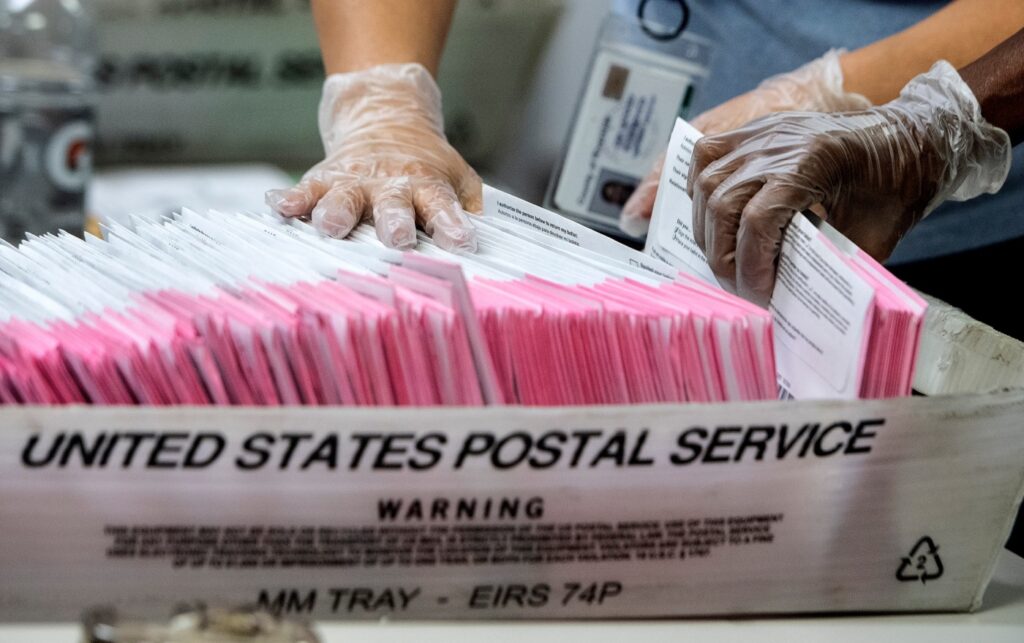
An Inland Southern California assemblymember wants Election Day focused on the voting booth instead of the mailbox.
Republican Assemblymember Bill Essayli’s legislation would overhaul California’s elections and strike the requirement to mail a ballot to every California registered voter while also trying to speed up the vote count.
The first legislation offered by new Republican Assemblymember Bill Essayli seeks to change how California elections are run. (Courtesy of Essayli campaign)
AB 13, which would make Election Day a state holiday, also seeks to end the practice of someone turning in multiple completed mail-in ballots, regardless of whether they live with the people who signed those ballots — an exercise known derisively in conservative circles as “ballot harvesting” that’s legal in California but banned in other states.
In a Dec. 5 news release, Essayli called AB 13 “his first official act” since being elected in November to represent the 63rd Assembly District in western Riverside County. He first ran for Assembly in 2018 and blamed ballot harvesting for contributing to his loss to Assemblymember Sabrina Cervantes, D-Riverside.
“These reforms will strengthen the integrity of our elections while ensuring the will of the voters is timely and accurately represented,” Essayli said in the release. He also lamented the amount of time it was taking to count votes in two legislative races with razor-thin margins.
Shawn Lewis, Essayli’s chief of staff, said AB 13 would allow anyone to request a permanent vote-by-mail ballot.
An AB 13 fact sheet from Essayli’s office states that the public’s trust in government and concerns over election fraud “have been an ever-growing issue across the nation.”
“Recent changes to the state’s laws regarding how votes are collected and counted have only exacerbated the problem,” the fact sheet states. “They have also prolonged the torturous process of waiting for final election results, in some cases to over a month.”
Despite occasional voter fraud arrests and false election fraud claims advanced by former President Donald Trump and his supporters, there’s been no proven case of widespread voter fraud in a U.S. election.
An Associated Press investigation found fewer than 475 cases of voter fraud out of 25.5 million votes cast in six battleground states in the 2020 presidential election. In November, the AP reported that state-level law enforcement units tasked with investigating voter fraud in the midterm elections found no evidence of systemic problems.
To speed up the vote count, AB 13 would shorten the deadline for county registrars to receive mail-in ballots from seven days to three days after Election Day.
It also would do away with vote centers — replacements for the traditional network of neighborhood polling places that open before Election Day and can be used by any registered voter to cast a ballot or change their voter registration.
Under AB 13, only family members or someone living in the same household would be able to return a filled-out mail-in ballot that’s not theirs. The bill also would bar counties from conducting all-mail-in elections.
AB 13 runs contrary to efforts by California’s Democratic leadership to make it easier to vote. The practice of mailing every voter a ballot started in 2020 as a measure to control the spread of COVID-19, and the state automatically registers to pre-registers eligible voters who seek driver’s licenses unless they opt out.
Academic observers said AB 13 stands little chance of passage in a legislature with a solid Democratic majority.
“Democrats strongly support mail-in voting,” Jack Pitney, a professor of politics at Claremont McKenna College, said via email. “Indeed, expect them to use this bill as an example of the voter-suppression tactics that Republicans would use if they ever returned to power in California.”
Related links
All California voters will be able to vote by mail in November
Is ballot harvesting legal in California? Yes, and that worries some Republicans
What would a Senate candidate representative of California look like?
How Jan. 6 impacted bipartisanship among California representatives
Bill seeks to require Legislature candidates to live in districts in which they’re running
AB 13 is being presented “as a serious effort to amend election laws rather than a more symbolic bill to protest vote-by-mail and ballot harvesting provisions in current state law,” Marcia Godwin, a professor of public administration at the University of La Verne, said via email.
However, “the bill contains enough poison pills that echo Trumpian talking points that it is unlikely to be taken seriously without further amendments,” Godwin said, describing the “poison pills” as the effort to roll back mail-in ballots and abolish vote centers and ballot harvesting.
The Election Day holiday part of AB 13 “could get serious attention,” Godwin said. “But it may be more viable as a standalone bill and with bipartisan cosponsors.”
In handicapping the bill’s odds given the legislature’s partisan makeup, Pitney and Godwin “sound more like lobbyists rather than academics,” Lewis, Essalyi’s spokesperson, said via email.
AB 13 was referred out of the Assembly’s rules committee Thursday, Jan. 26, Lewis said.
